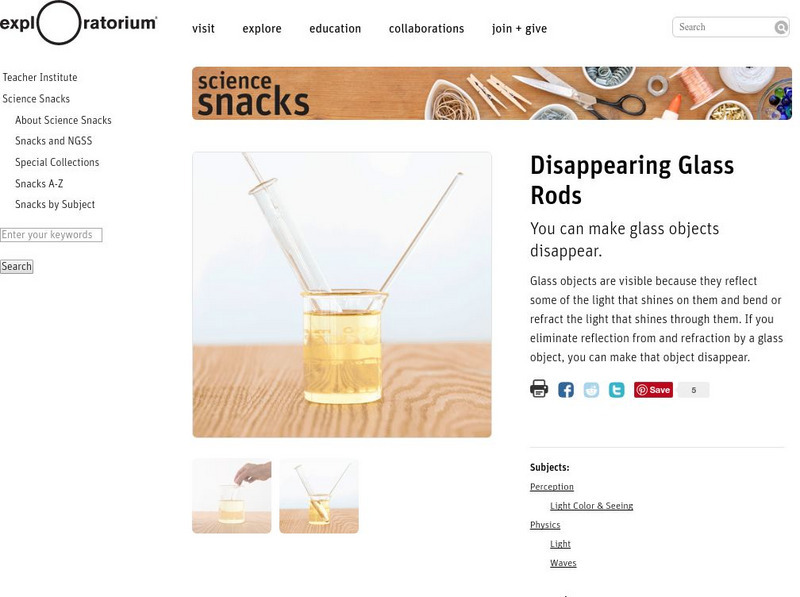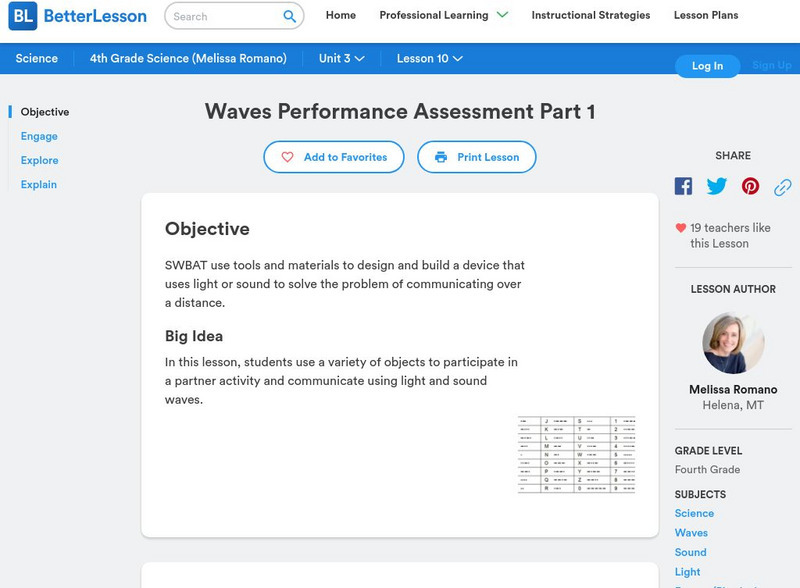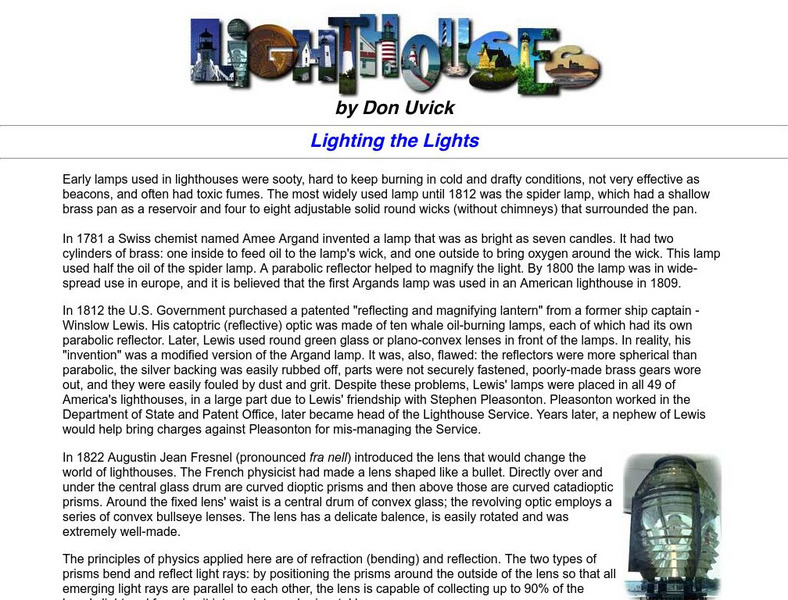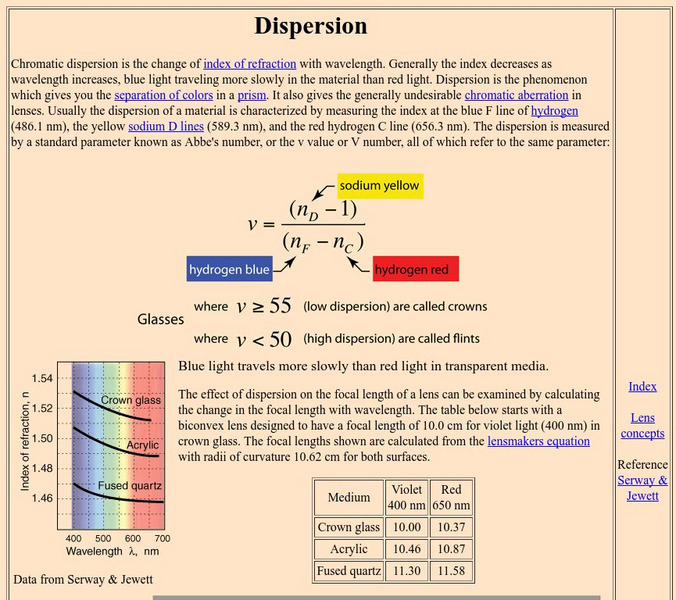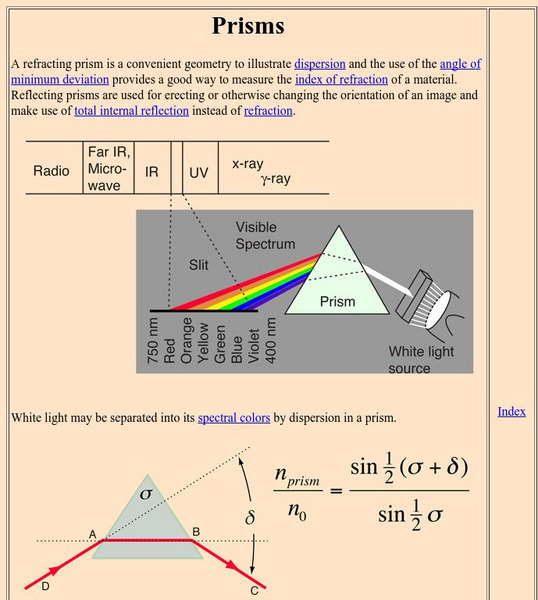My Science Site
Optics: Energy and Control [Pdf]
A very comprehensive unit including topics such as light and its source, visible sources of light, transparency of objects and much more. Also offers a resource list, blackline masters, and expectation list, expectation summary and a...
Science Education Resource Center at Carleton College
Serc: Com Padre: The Magic of Optics: Now You See It, Now You Don't
A lesson demonstrating the concept of refraction. It uses a highly engaging 'magic' trick where a smashed glass tube is seemingly put back together.
Exploratorium
Exploratorium: Science Snacks: Disappearing Glass Rods
In this activity, you will make a glass object disappear by eliminating the reflection from and the refraction by the glass object.
Center of Science and Industry
Cosi Columbus: Two Lenses in One
Investigate the behavior of a water filled vial, and discover why it acts like a magnifier. Includes full list of materials, procedures, and scientific explanation of what causes light rays to change direction.
Georgia State University
Georgia State University: Hyper Physics: Total Internal Reflection
This physics department site provides a definition and explanation of the phenomenon of total internal reflection. Includes a diagram and an equation for calculating the critical angle for light approaching a surface.
Better Lesson
Better Lesson: Waves Performance Assessment Part 1
Students will use a variety of objects to participate in a partner activity and communicate using light and sound waves. Resources include a video, pictures and videos of the lesson in action, and examples of student work.
University of Maryland
Optics Highlights: Optics, Electromagnetic Waves, Quanta
Part of an anecdotal history on optics and the study of light. Extremely thorough treatment of the scientific evidence which led scientists to believe in the particle nature of light. Includes a short biographical sketch and discusses...
University of Maryland
Optics Highlights: The Microscope
Part of an anecdotal history of optics and the study of light. Extremely thorough treatment of the scientific findings and developments which led to the invention and refinement of the microscope. Includes a short biographical sketch and...
Exploratorium
Exploratorium: Science Snacks: Convection Currents
Get a visual of convention currents with this activity. This activity allows students to observe the currents by bending light due to cold and warm water.
ClassFlow
Class Flow: Introduction to Light
[Free Registration/Login Required] This flipchart introduces fifth graders to the science of light. Principles such as transparent, translucent, opaque, reflection, and refraction are covered. Concave and convex mirrors and lenses are...
Other
Lighthouses: Lighting the Lights
A description of the early lights used in lighthouses and how these lights evolved into what they are today. Explains the contributions of Fresnel to the development of these lights; discusses the Fresnel orders.
Physics Classroom
The Physics Classroom: Refraction and the Ray Model of Light: Converging Lenses
An illustrated tutorial which takes students step-by-step through the process of drawing ray diagrams.
Physics Classroom
The Physics Classroom: Refraction and the Ray Model of Light: Anatomy of a Lens
Illustrated diagrams in this tutorial help students understand the properties and functions of lenses.
Physics Classroom
The Physics Classroom: Refraction/ray Model of Light: Image Formation/detection
Students discover the four parts of the eye are the most instrumental in the task of producing images that are discernible by the brain.
Physics Classroom
The Physics Classroom: Refraction/ray Model of Light: Farsightedness/correction
A brief introduction to the physics side of farsightedness, and how lenses correct this vision defect.
Physics Classroom
The Physics Classroom: Refraction/ray Model of Light: Nearsightedness/correction
A brief introduction to the physics side of nearsightedness, and how lenses correct this vision defect.
Physics Classroom
The Physics Classroom: Lesson 3: Concave Mirrors
Lesson 3 of this tutorial on refraction is on concave mirrors. Content that is covered includes the anatomy of curved mirrors, reflection of light and image formation, ray diagrams, image characteristics for concave mirrors, plus more.
Georgia State University
Georgia State University: Hyper Physics: Dispersion
The phenomenon of light dispersion is explained with a formula and a practice form for calculating Abbe's number.
Khan Academy
Khan Academy: Eye Disease and Contact Lenses
Punctate keratitis is an eye disease that results in abrasions on the epithelial cornea. One of the leading causes of the disease is the overuse of contact lenses. A research team is investigating the optical properties of four new types...
Khan Academy
Khan Academy: Thin Lens Sign Conventions
Have you ever wondered why some people need glasses and others don't? It's because of the way light is focused by the lens in your eye. This lens, like magnifying glasses, eyeglasses, and contact lenses, is considered a thin lens.
Utah Education Network
Uen: Enlightening Explorations, Part Iii
This lesson contains the following labs: Rainbows, Refraction with Prisms, and What Color Is It? Students will study light by reading various nonfiction texts and viewing a video lesson. Then students will engage in the following labs:...
Utah Education Network
Uen: I'm So Bright! I Wear My Shades Indoors!
This instructional activity engages students in learning about light through multiple sources. Students will learn how light is produced, reflected, refracted, and separated. Students will communicate their findings through an...
Utah Education Network
Uen: Enlightening Explorations, Part Ii
This activity engages students in learning about light. Studets will describe how light is produced, reflected, refracted, and separated.
Georgia State University
Georgia State University: Hyper Physics: Prisms
This physics department site explains how prisms work and their purpose in the dispersion of light. Explains the angle of deviation and includes an interactive form in which visitors calculate the angle of deviation and receive immediate...
![Optics: Energy and Control [Pdf] Lesson Plan Optics: Energy and Control [Pdf] Lesson Plan](https://static.lp.lexp.cloud/images/attachment_defaults/resource/large/FPO-knovation.png)

